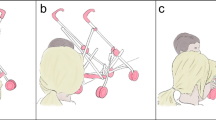Abstract
There is a growing interest in the mathematics education community in the notion of abstraction and its significance in the learning of mathematics. “Reducing abstraction” is a theoretical framework that examines learners’ behavior in terms of coping with abstraction level. It refers to situations in which learners are unable to manipulate concepts presented in a given problem; therefore, they unconsciously reduce the level of abstraction of the concepts involved to make these concepts mentally accessible. This framework has been used for explaining students’ conception in different areas of undergraduate mathematics and computer science. This article extends the applicability scope of this framework from undergraduate mathematics to school mathematics. We draw on recently published research articles and exemplify how students’ behavior can be described in terms of various interpretations of reducing abstraction level.
Similar content being viewed by others
References
Aharoni, D.: 1999, Undergraduate Students’ Perception of Data Structures, Ph.D. Thesis, Technion – Israel Institute of Technology.
Beth, E.W. and Piaget, J.: 1966, Mathematical Epistemology and Psychology, D. Reidel, Dordrecht.
Carpenter, P.T., Lindquist, M.M., Matthews, W. and Silver, E.A.: 1983, ‘Results of the third NAEP mathematics assessment: Secondary school,’ Mathematics Teacher 76(9), 652–659.
Davydov, V.V.: 1990, J. Kilpatrick (ed.), J. Teller (Trans.), Soviet Studies in Mathematics Education: Vol. 2. Types of Generalization in Instruction: Logical and Psychological Problems in the Structuring of School Curricula, National Council of Teachers of Mathematics, Reston, VA. (Original work published in 1972).
Dreyfus, T. and Gray, E.: 2002, ‘Research Forum 1—Abstraction: Theories about the emergence of knowledge structures,’ in A.D. Cockburn and E. Nardi (eds.), Proceedings of the 26th Conference of International Group for the Psychology of Mathematics Education, Vol. I, University of East Anglia, pp. 113–138.
Dubinsky, E.: 1991, ‘Reflective abstraction in advanced mathematical thinking,’ in D. Tall (ed.), Advanced Mathematical Thinking, Kluwer Academic press, Dordrecht, pp. 95–123.
Dubinsky, E., Dautermann, J., Leron, U. and Zazkis, R.: 1994, ‘On learning fundamental concepts of group theory,’ Educational Studies in Mathematics27, 267–305.
Dubinsky, E. and Leron, U.: 1994, Learning Abstract Algebra with Isetl,Springer-Verlag, New York/Berlin.
Frorer, P., Hazzan, O. and Manes, M.: 1997, ‘Revealing the faces of abstraction,’ The International Journal of Computers for Mathematical Learning 2(3), 217–228.
Harel G. and Sowder L.: 1998, ‘Students’ proof schemes,’ inE. Dubinsky, A. Schoenfeld and J. Kaput (eds.), Research in Collegiate Mathematics Education, Vol. III, American Mathematical Society, pp. 234–283.
Hazzan, O.: 1999, ‘Reducing abstraction level when learning abstract algebra concepts,’ Educational Studies in Mathematics 40(1), 71–90.
Hazzan, O.: 2003a, ‘How students attempt to reduce abstraction in the learning of mathematics and in the learning of computer science,’ Computer Science Education 13(2), 95–122.
Hazzan, O.: 2003b, ‘Reducing abstraction when learning computability theory,’ Journal of Computers in Mathematics and Science Teaching (JCMST), 22(2), 95–117.
Heirdsfield, A.M. and Cooper, T.J.: 2002, ‘Flexibility and inflexibility in accurate mental addition and subtraction: Two case studies,’ Journal of Mathematical Behavior 21, 57–74.
Hershkowitz, R., Parzysz, B. and van Dermolen, J.L: 1996, ‘Space and shape,’ in A.J. Bishop, K. Clements, C. Keitel, J. Kilpatrick and C. Laborde (eds.), International Handbook of Mathematics Education, Vol. I, Kluwer, Dordrecht, The Netherlands, pp. 161–204.
Hershkowitz, R., Schwarz, B.B. and Dreyfus, T.: 2001, ‘Abstraction in context: Epistemic actions,’ Journal for Research in Mathematics Education 32, 195–222.
Kaminski, E.: 2002, ‘Promoting mathematical understanding: Number sense in action,’ Mathematics Education Research Journal 14(2), 133–149.
Karsenty, R.: 2002, ‘What do adult remember from high school mathematics? The case of linear functions,’ Educational Studies in Mathematics 51(1, 2), 117–144.
Knuth, E.K.: 2002, ‘Teachers’ conceptions of proofs in the context of secondary school mathematics,’ Journal of Mathematics Teacher Education5(1), 61–88.
Noss, R. and Hoyles, C.: 1996, Windows on Mathematical Meanings—Learning Cultures and Computers, Kluwer Academic Publishers, Dordrecht.
Raychaudhuri, D.: 2001, The Tension and the Balance Between One Mathematical Concept and Student Constructions of It: Solution to a Differential Equation, Ph.D. Thesis, Simon Fraser University, Vancouver, Canada.
Schoenfeld, A.H.: 1989, ‘Explorations of students’ mathematical beliefs and behavior,’ Journal for Research in Mathematical Education 20(4), 338–355.
Schoenfeld, A.: 1998, ‘On theory and models: The case of teaching-in-context,’ in S. Berenson, K. Dawkins, M. Blanton, W. Coulombe, J. Kolb, K. Norwood and L. Stiff (eds.), Proceeding of the 20th Annual Meeting of the North American Chapter of the International Group for the Psychology of Mathematics Education, North Carolina State University, Raleigh, NC, pp. 27–38.
Schoenfeld, A.H.: 1989, ‘Explorations of students’ mathematical beliefs and behavior,’ Journal for Research in Mathematical Education 20(4), 338–355.
Sfard, A.: 1991, ‘On the dual nature of mathematical conceptions: Reflections on processes and objects as different sides of the same coin,’ Educational Studies in Mathematics 22, 1–36.
Sfard, A.: 1992, ‘Operational origins of mathematical objects and the quandary of reification—The case of function,’ in E. Dubinsky and G. Harel (eds.), The Concept of Function—Aspects of Epistemology and Pedagogy, MAA Notes.
Tall, D.: 1991, (ed.), Advanced Mathematical Thinking, Kluwer Academic Press, Dordrecht.
Thompson, P.W.: 1985, ‘Experience, problem solving, and learning mathematics: Considerations in developing mathematics curricula,’ in E.A. Silver (ed.), Teaching and Learning Mathematical Problem Solving: Multiple Research Perspective, Hillsdale, NJ, pp. 189–236.
Wilensky, U.: 1991, ‘Abstract meditations on the concrete and concrete implications for mathematical education,’ in I. Harel and S. Papert (eds.), Constructionism, Ablex Publishing Corporation, Norwood, NJ, pp. 193–203.
Zazkis, R. and Campbell, S.: 1996, ‘Divisibility and multiplicative structure of natural numbers: Preservice teachers’ understanding,’ Journal for Research in Mathematics Education 27(5), 540–563.
Zazkis, R., Liljedahl, P. and Gadowsky, K.: 2003, ‘Students’ conceptions of function translation: Obstacles, intuitions and rerouting,’ Journal of Mathematical Behavior22, 437–450.
Author information
Authors and Affiliations
Corresponding author
Rights and permissions
About this article
Cite this article
Hazzan, O., Zazkis, R. Reducing Abstraction: The Case of School Mathematics. Educ Stud Math 58, 101–119 (2005). https://doi.org/10.1007/s10649-005-3335-x
Issue Date:
DOI: https://doi.org/10.1007/s10649-005-3335-x




